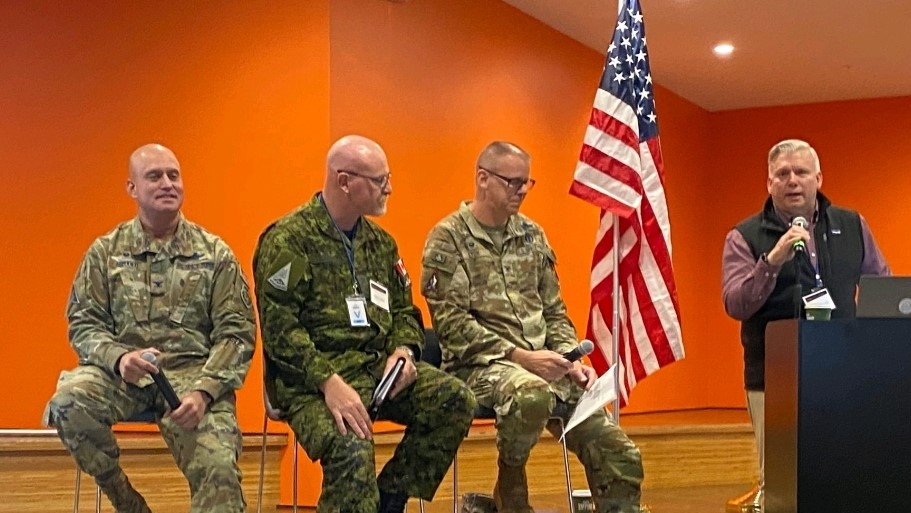
Col. Raj Agrawal, commander of Space Delta 2-Space Domain Awareness (left); Canadian Armed Forces Brig. Gen. Kyle C. Paul, Space Operations Command deputy for transformation (center); Col. Stephen Lyon, director of US Space Command’s National Space Defense Center (right); and retired Air Force Col. Scott Brodeur (podium) at the kick off of the Space Domain Awareness TAP Lab Accelerator Oct. 28, 2023. (Space Force photo: Paul Contoveros)
WASHINGTON — The Space Force’s newest technology accelerator, aimed at speeding improvements in space domain awareness, is kicking off with a focus on developing software to help protect satellites in geosynchronous Earth orbit from anti-satellite missiles, the service announced today.
Run by Space Systems Command (SSC), the Space Domain Awareness Tools, Applications, and Process (TAP) Lab is headquartered in Colorado Springs, Colo., and is being supported by Virginia Tech’s Applied Research Corporation and MITRE Corporation. SSC, the Air Force Research Laboratory, and the Air Force Office of Scientific Research are to work together under the program “to convert cutting edge software prototypes into commercial products,” the press release said. SSC is the Space Force’s primary acquisition command.
The goal of the accelerator is to bring industry, government and academia together to integrate SDA computer systems to “fully leverage” data from myriad sources across the Defense Department, the Intelligence Community, other government agencies, allies and commercial firms — a seemingly unsolvable problem that has bedeviled the Pentagon for decades.
The TAP Lab will bring in up to four mixed “cohorts” each year, and give them three months to work on different problems relating to space domain awareness, threat warning and assessment, and space battle management — with the possibility of follow-on contracts with the Space Force and other government agencies.
“Space domain awareness is a complex problem and we need industry to help solve it,” said Maj. Sean Allen, the Space Domain Awareness TAP Lab Accelerator’s first chief, in the press release. “We are here to enable space superiority missions by avoiding operational surprise, denying the first mover advantage, and aiding responsible counterspace campaigns by collaborating across industry and government, providing expert mentorship, interacting with operators, and make measurable advances in space defense.”
The TAP Lab concept is not new, having been initiated in the mid-2000s by the Space Force’s predecessor, Air Force Space Command, but then left fallow for years until being re-opened by in 2021.
The Space Domain Awareness TAP Lab’s inaugural meeting drew some 200 participants, according to the Space Force release, and included briefings by Canadian Armed Forces Brig. Gen. Kyle C. Paul, deputy commander of the Space Force’s Space Operations Command-Transformation group; Barbara Golf, SSC’s strategic advisor for space domain awareness; Col. Stephen Lyon, commander of Space Delta 15 and director of the National Space Defense Center; and Col. Raj Agrawal, commander of Space Operations Command’s Space Delta 2-Space Domain Awareness.








